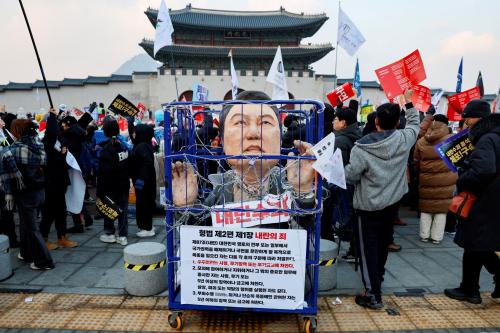RENEE MONTAGNE: China today confirmed it will host talks this month on North Korea’s nuclear program. Officials from the United States, North Korea, South Korea, China, Japan and Russia will attend. Commentator Michael O’Hanlon says Washington should think about changing its approach to making the region safer and more stable in the long run.
MICHAEL O’HANLON: President Bush finally appears to have gotten the hermit kingdom’s leader, Kim Jung Il, to agree to negotiations, and mostly on US terms, but smart money would still have to bet against major progress in the coming talks.
First of all, North Korea’s leaders are fickle, ornery and paranoid—not a good combination. They may just announce at the coming talks that they have a nuclear arsenal and no intention of giving it up. They may try to justify their decision by complaining about Mr. Bush and his doctrine of pre-emption. North Korea may fear a US attack so much that it thinks it needs nuclear weapons to prevent it.
Or, on the other hand, North Korea may not really fear an American attack much at all. It realizes any war on the peninsula would kill tens of thousands of South Koreans, and quite probably thousands of US troops, and it knows that we know that, too. It may not feel very intimidated, and our threats may not be very credible.
Either way, if it’s willing to give up its nuclear weapons at all, North Korea may hold out for major incentives to de-nuclearize, and that could be a show-stopper. President Bush may be willing to offer a pledge that we won’t attack North Korea while talks continue, but that’s about as far as he sounds like he’s willing to go, and that’s not likely to be good enough. For one thing, North Korea has already basically had that kind of deal—no nuclear weapons for its own arsenal and no American attack—under President Clinton. Yet, it started its secret uranium enrichment program at that time anyway in violation of at least three major accords that it signed.
Even more fundamentally, a deal focused on nuclear weapons won’t address North Korea’s underlying problem—its failed economy, which has shrunk in half since the Cold War ended and which continues to decline. So Mr. Bush needs to think bigger. He should challenge North Korea to reform the way China and Vietnam have reformed in the last couple of decades. He should offer substantial help, including aid and a lifting of trade sanctions from the United States and from our regional partners but only if North Korea will make many more concessions than simply on the nuclear weapons issue. It should also eliminate chemical and biological weapons, stop its counterfeiting and drug trafficking, improve its human rights record and, most of all, cut its conventional military at least in half, because without that kind of cut, there is no hope for economic reform.
If Pyongyang will agree to this radical reform proposal, we can afford to be generous, and if it fails, we’ll be better positioned than we are today to convince our regional partners—South Korea, Japan, China and Russia—that much tougher measures are needed.
The Brookings Institution is committed to quality, independence, and impact.
We are supported by a diverse array of funders. In line with our values and policies, each Brookings publication represents the sole views of its author(s).


Commentary
U.S. Would Do Well To Broaden Scope of North Korean Talks
August 14, 2003